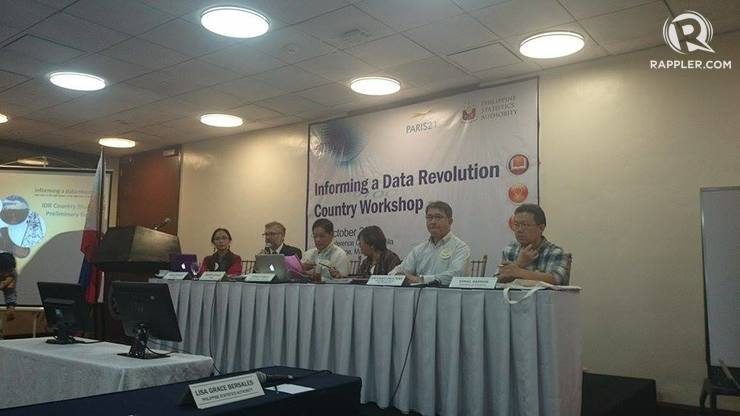SUMMARY
This is AI generated summarization, which may have errors. For context, always refer to the full article.

MANILA, Philippines – Improved data production, dissemination, accessibility, and utilization are essential in a developing country.
The statement was made by panelists from government and the private sector at a workshop organized on Tuesday, October 28, by Partnership in Studies for Development in the 21st Century (PARIS21) and the Philippine Statistics Authority (PSA).
The panelists highlighted the call for a data revolution – unlocking the power of data for better statistics, policies, and lives.
The idea of having a data revolution, according to the panelists, was lifted from the report on the Post-2015 Development Goals, which states: “The availability of data empowers people. It arms them with information and allows them to hold leaders accountable for their promises.”
National Statistician and PSA head Lisa Grace Bersales said data revolution is like a virus growing fast due to the “enabling environment.”
“People are now aware of the fact that data should be processed into information, and information into knowledge,” Bersales said.
PARIS21 Project Manager Trevor Fletcher added that unlocking the power of data can be done “by getting the right data to the right people, at the right time, in the right format.”
The workshop was organized after PARIS21 launched in March the Informing a Data Revolution (IDR) project, which aims to produce a road map that will support the Post-2015 development process. The project tapped 7 countries, including the Philippines through the PSA, where data stakeholders like legislators, government officials, and the media were surveyed on their data needs and goals.
Road map
The panelists described the road map as the response to the burden in data revolution of developing countries.
Part of the objectives of the road map is to reach consensus among statisticians, legislators, and donors at various levels for statistical development.
Former National Statistical Coordination Board (NSCB) Secretary-General Romulo Virola said staff training and skills development should also be made priorities of the roadmap. He also said there is a need for people with statistical background not just within PSA but also in the Philippine Statistical System (PSS).
Bersales agreed, saying that the statisticians’ work is very vital. “PSA and PSS can’t do it alone. I feel that everybody agrees that we should have a road map,” she added.
Presidential Management Staff (PMS) Undersecretary Ferdinand Cui Jr added that there should be harmonization for plans across different planning agencies, and that data should be up to date.
Cui also suggested that the road map “should be suitable to the Philippines.”
Open Data
Fletcher noted that one of the important enablers of innovation that helps in data revolution is open data.
“Open data makes public data more available,” he said.
According to a tool kit of World Bank Organization, data is open if it can be technically opened (retrieved and processed) and legally opened (used commercially and non-commercially and re-used without restrictions).
In the workshop, Fletcher presented an open data barrometer that shows a multidimensional scan of Open Government Data (OGD) policy and practice across the world.
In the Philippines, the government has a website that provides consolidated open data from the different agencies of the government. (READ: Data.gov.ph launches: Open data for good governance) – Rappler.com
Add a comment
How does this make you feel?
There are no comments yet. Add your comment to start the conversation.